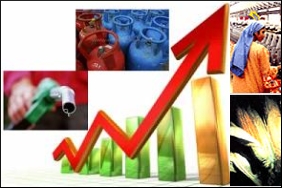|
|
|
India's fuel subsidies don't help poor, says expert
|
|

|
|
| Top Stories |
 |
|
|
|
IANS | 23 Apr, 2010
India's fuel subsidies don't actually help poor households but instead benefit those who can afford to own vehicles and electrical appliances, according to a leading expert.
"When the price of crude oil jumped a few years ago, the Indian government was stuck paying the difference between the regulated price to consumers and the actual price of oil on international markets," said David Victor, professor of political science with University of California San Diego's (UCSD) School of International Relations and Pacific Studies.
India spends an estimated $15 billion to subsidise fuels, he said.
In his study, "The Politics of Fossil-Fuel Subsidies", Victor said: "The money the Indian government spent on those subsidies was not available for other more beneficial programmes to reduce poverty and facilitate economic development."
As a large oil importer, India's energy security remains vulnerable to interruptions in its supply of crude oil or to sudden spikes in price, he said in a release by the Global Subsidies Initiative (GSI) of the International Institute for Sustainable Development (IISD).
GSI's goal is to reform, reduce and ultimately eliminate fossil-fuel subsidies, which are highest in Iran, Russia, China, Saudi Arabia, India and Venezuela.
Victor said "China was in a vulnerable energy-security situation similar to India's, but the Chinese government took the major political step of reducing subsidies sharply and exposing consumers to market forces.
"It makes China more secure by reducing growth in its consumption of fossil fuels and forcing consumers to respond when markets tighten. It also helps China reduce its rate of increase of greenhouse gas emissions and enables it to invest in renewable energy and other sustainable development projects," he said.
The pressure for subsidies extends to many other countries as well.
Victor's assessment found that as of November 2008, Venezuela had the lowest gasoline prices of any country, prices maintained at their low due to subsidies.
While Iran's fuel prices are nearly as low, the financial burden on that nation was much higher because its fuel consumption is greater.
"Iran's fuel subsidy totals about $55 billion a year, or roughly one-tenth of global energy subsidies," said Victor.
"Virtually, every analysis of fossil-fuel subsidies has shown that most are a complete waste of money, or worse, because money spent on subsidies isn't available for other purposes that yield much greater social benefits such as education and rural agriculture," he said.
"As a result, consumers in those countries are not only using more fossil fuels, but are also demanding more subsidies, which are plunging those countries into an economic death spiral."
A comprehensive assessment of global fossil-fuel subsidies has found that governments were spending $500 billion annually on policies that undermine energy security and worsen the environment, he said.
|
|
|
| |
|
|
|
|
|
|
|
|
|
|
|
|
|
|
| |
| Customs Exchange Rates |
| Currency |
Import |
Export |
US Dollar
|
84.35
|
82.60 |
UK Pound
|
106.35
|
102.90 |
Euro
|
92.50
|
89.35 |
| Japanese
Yen |
55.05 |
53.40 |
| As on 12 Oct, 2024 |
|
|
| Daily Poll |
 |
 |
| Do you think Indian businesses will be negatively affected by Trump's America First Policy? |
|
|
|
|
|
| Commented Stories |
 |
|
|
|
|
|
| |
|